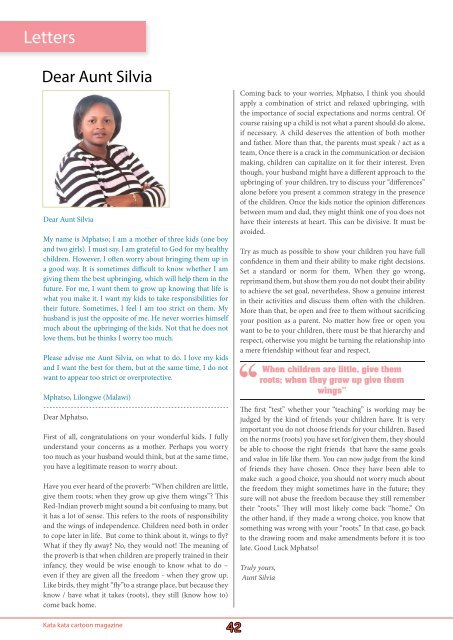2015 EDITION Vol.3 Issue 11 DIGITAL
You also want an ePaper? Increase the reach of your titles
YUMPU automatically turns print PDFs into web optimized ePapers that Google loves.
Letters<br />
Dear Aunt Silvia<br />
Dear Aunt Silvia<br />
My name is Mphatso; I am a mother of three kids (one boy<br />
and two girls). I must say, I am grateful to God for my healthy<br />
children. However, I often worry about bringing them up in<br />
a good way. It is sometimes difficult to know whether I am<br />
giving them the best upbringing, which will help them in the<br />
future. For me, I want them to grow up knowing that life is<br />
what you make it. I want my kids to take responsibilities for<br />
their future. Sometimes, I feel I am too strict on them. My<br />
husband is just the opposite of me. He never worries himself<br />
much about the upbringing of the kids. Not that he does not<br />
love them, but he thinks I worry too much.<br />
Please advise me Aunt Silvia, on what to do. I love my kids<br />
and I want the best for them, but at the same time, I do not<br />
want to appear too strict or overprotective.<br />
Mphatso, Lilongwe (Malawi)<br />
Dear Mphatso,<br />
First of all, congratulations on your wonderful kids. I fully<br />
understand your concerns as a mother. Perhaps you worry<br />
too much as your husband would think, but at the same time,<br />
you have a legitimate reason to worry about.<br />
Have you ever heard of the proverb: “When children are little,<br />
give them roots; when they grow up give them wings”? This<br />
Red-Indian proverb might sound a bit confusing to many, but<br />
it has a lot of sense. This refers to the roots of responsibility<br />
and the wings of independence. Children need both in order<br />
to cope later in life. But come to think about it, wings to fly?<br />
What if they fly away? No, they would not! The meaning of<br />
the proverb is that when children are properly trained in their<br />
infancy, they would be wise enough to know what to do –<br />
even if they are given all the freedom - when they grow up.<br />
Like birds, they might “fly”to a strange place, but because they<br />
know / have what it takes (roots), they still (know how to)<br />
come back home.<br />
Coming back to your worries, Mphatso, I think you should<br />
apply a combination of strict and relaxed upbringing, with<br />
the importance of social expectations and norms central. Of<br />
course raising up a child is not what a parent should do alone,<br />
if necessary. A child deserves the attention of both mother<br />
and father. More than that, the parents must speak / act as a<br />
team, Once there is a crack in the communication or decision<br />
making, children can capitalize on it for their interest. Even<br />
though, your husband might have a different approach to the<br />
upbringing of your children, try to discuss your “differences”<br />
alone before you present a common strategy in the presence<br />
of the children. Once the kids notice the opinion differences<br />
between mum and dad, they might think one of you does not<br />
have their interests at heart. This can be divisive. It must be<br />
avoided.<br />
Try as much as possible to show your children you have full<br />
confidence in them and their ability to make right decisions.<br />
Set a standard or norm for them. When they go wrong,<br />
reprimand them, but show them you do not doubt their ability<br />
to achieve the set goal, nevertheless. Show a genuine interest<br />
in their activities and discuss them often with the children.<br />
More than that, be open and free to them without sacrificing<br />
your position as a parent. No matter how free or open you<br />
want to be to your children, there must be that hierarchy and<br />
respect, otherwise you might be turning the relationship into<br />
a mere friendship without fear and respect.<br />
When children are little, give them<br />
roots; when they grow up give them<br />
wings”<br />
The first “test” whether your “teaching” is working may be<br />
judged by the kind of friends your children have. It is very<br />
important you do not choose friends for your children. Based<br />
on the norms (roots) you have set for/given them, they should<br />
be able to choose the right friends that have the same goals<br />
and value in life like them. You can now judge from the kind<br />
of friends they have chosen. Once they have been able to<br />
make such a good choice, you should not worry much about<br />
the freedom they might sometimes have in the future; they<br />
sure will not abuse the freedom because they still remember<br />
their “roots.” They will most likely come back “home.” On<br />
the other hand, if they made a wrong choice, you know that<br />
something was wrong with your “roots.” In that case, go back<br />
to the drawing room and make amendments before it is too<br />
late. Good Luck Mphatso!<br />
Truly yours,<br />
Aunt Silvia<br />
Kata kata cartoon magazine<br />
42

















